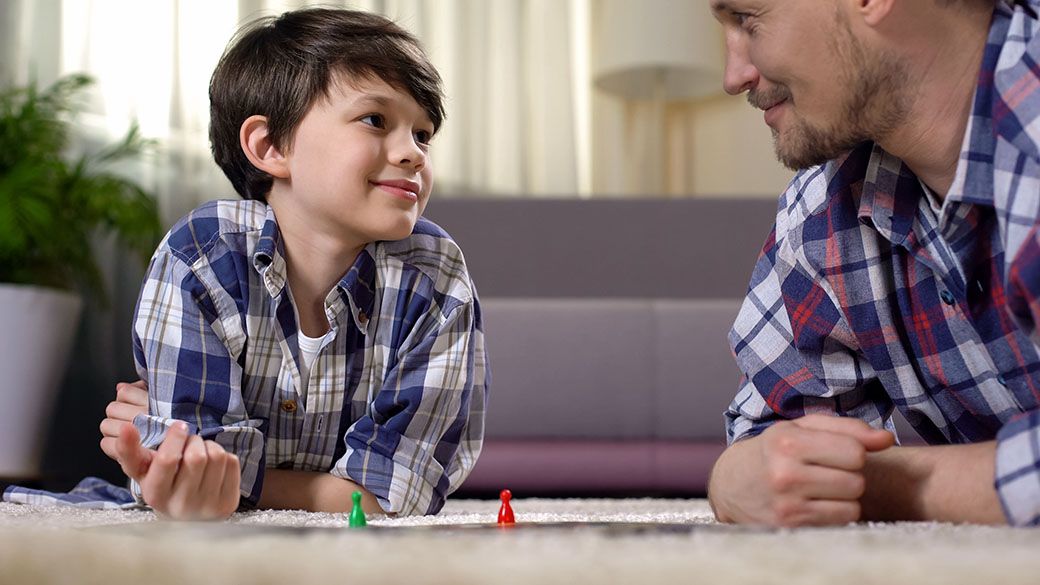Sometimes I am so busy being a parent, I forget I’m a child psychologist. This has been especially true lately in this current pandemic. Stress at home runs high and I routinely witness the impact of that stress unfold right before my eyes with my own two children. Just this week, my 4-year-old was on his 5th consecutive day of throwing a tantrum for an unidentified reason. At night, I would review the day trying to understand the triggers so we could circumvent a repeated emotional explosion the next day. I asked him over and over to put into words what was bothering him and I was met with an escalation of emotion each time. I would “guess” his frustration, thinking it had something to do with the changes in our lives since CoVid-19, but each attempt was off the mark.
It wasn’t until the 6th night, while playing a family card game, that I decided to try a different strategy. I asked each of my children to share an emotion they felt that day when it was their turn to draw a card. I was surprised when that same 4-year-old blurted out, “I’m so MAD that I can’t go to Target! I HATE the virus.” Without the neutral element of the card game and the low-key request to share a feeling, I’m not sure I would have ever surmised that my youngest missed going shopping.
When working with children of many different ages, therapists often utilize games. They are an engaging way to build the therapeutic relationship and can also help a therapist understand information about a child such as their tolerance for frustration, decision making, problem solving, perspective taking and social skill abilities. Some games are specifically designed for therapists to use as tools in the office. But there are also many games that can be easily modified to engage your own child in emotion identification, emotional expression, and problem solving. Here are a few that you could likely pull out of your playroom on any given day.
Feelings Uno. This was the game mentioned above that I was playing with my kids. You add a simple twist to the normal Uno game, utilizing the colors. Decide beforehand what each color will represent. For example, blue can stand for sad, tired or bored. Green is happy, calm, focused, and in control. Yellow means worried or nervous. Finally, red stands for frustrated or angry. Every time a game player chooses a colored card, ask them to share a time they felt that way or indicate when they saw someone else feel that way. In a similar fashion, the games Twister and Jenga can also be modified to address emotion identification and expression.
Social Charades. A major component of social skills is learning to read and understand the social cues of others. These clues include body language, tone of voice, and facial expressions. You can help your child practice by playing social charades. Create a list of different actions such as riding a rollercoaster, going to the dentist, or dropping your ice cream. Each participant will randomly choose from the list and act it out for the other players. Both the actor and the player benefit from choosing which social cues would match the action.
Roll and Spin a Coping Strategy. For this game, you can use a spinner from a game you already have. Assign each number to a different coping strategy. Ideas include belly breathing, progressive muscle relaxation, positive self-talk, and imagery. Each time a player spins a number, they are asked to describe a situation when they might use the strategy and practice how it is done. Asking children to practice coping strategies when they are already calm and in low stress situations helps them call up the skill when they are distressed.
The above outline some simple ideas to help engage your child at home. They may stand alone or work in conjunction with an expert. Additionally, CBT providers can help further develop these skills in therapy when promoted by parents. These are ways to solidify the practice and skills learned within therapy sessions and are helpful in the translation of that work into the home.
For my child, playing Feelings Uno uncovered an emotion of anger that I had not otherwise recognized. Playing the game opened the door for us to talk later that night about the things he misses about going to Target. It turns out that before we needed to stay at home due to CoVid-19, going to Target was something my son looked forward to on a weekly basis. I thought it was a simple shopping trip, but he was able to put into words that we would do that together when his older brother was in school. This new information helped me develop a plan to carve out some time to spend just with him.

